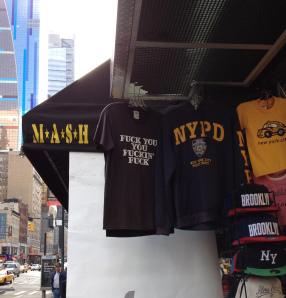
I’m glad to be back in New York City. It’s a funny place. A walk down the street can be an education. When I saw this shirt the other day, I had a thought—what happens when words lose their meaning? I’ve been fascinated by the concept of “bad words” since I was a kid. Although I never uttered them, I wondered why they were considered bad. That thought gets stretched out a big longer in this instance, to wondering whether overuse destroys the power of the swear. Although most religions claim taboo words are made that way by god(s), some psychologists have suggested that the function of swearing lies precisely in its ability to shock. If so, what happens when the shock wears off? We may need to come up with new words for copulation to take the place of the f-bomb. And it’s not just naughty words that are at risk.
I saw a report a while back that made reference to “Libertarian fundamentalist Jimmy Wales.” Wales is at least the co-, if not sole, founder of Wikipedia. The libertarian label didn’t surprise me, but the fundamentalist part did. Wales is no conservative religious believer. Of all people fundamentalists are the least likely to support a wiki concept where the final version is never nailed down. It would be like reading a Bible where the words keep floating around the pages, shifting combinations, changing meanings. Of course, the concept of words even having meanings is a matter of debate. A colleague of mine used to remind me, “words don’t have meanings, they have usages.” He was technically correct. Even the f-bomb, when uttered in other languages, as sophomorically portrayed in many a movie, has an entirely different usage.
Dictionaries are filled with archaic words. I don’t recall the last time I saw eftsoons in print, or iwis, or maugre. Have they lost their meanings, or just their usages? In any case they live on in written language history. Overuse of a word leads to calls for restraint among literary types, as when the word “awesome” got out of control a few years back. The case for the f-word is somewhat different. When I walk through the streets of the city it is obvious that it is one word that is in no danger of dying out. The gerund, or more properly, adjectival form ending in -ing, is freely interspersed in blasé sentences with complete abandon. For some people it appears to fill the mental pause generally reserved for “uh” or “um.” When it ceases to shock us, it will become just another Howard Stern of the lexical world. And some tee-shirts, I expect, will be available quite cheaply then.
